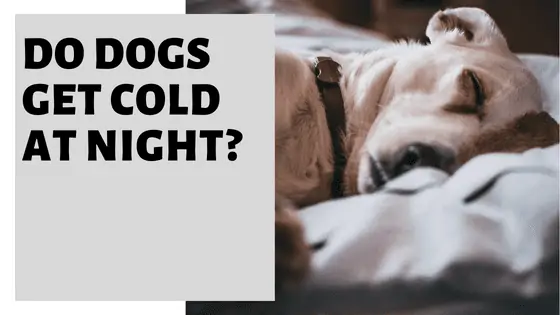Introduction
As temperatures drop, dog owners may wonder, “Do dogs get cold at night” Understanding how our canine companions react to colder weather is crucial for ensuring their comfort and well-being. This article explores Why Do Dogs Get Cold at Night and provides actionable tips to keep your furry friend warm and content during chilly nights.

Physiology of Dogs in Cold Weather
Dogs, like humans, have mechanisms to regulate body temperature. However, factors such as age, size, and coat type can influence a dog’s susceptibility to the cold. Exploring these physiological aspects helps us better understand how to address their needs in colder weather.
Signs that Your Dog is Cold
Recognizing signs of discomfort is essential for proactive care. Behavioral cues, such as shivering or seeking warmth, along with physical signs like cold ears or paws, indicate that your dog may be feeling the chill. Being attuned to these signals allows you to take prompt action.
Breeds Prone to Cold Sensitivity
Certain dog breeds are more sensitive to colder temperatures. By identifying these breeds, owners can take extra precautions to ensure their well-being during colder nights. Special considerations, such as providing additional insulation or clothing, can make a significant difference.

Tips for Keeping Your Dog Warm at Night
Creating a warm and inviting sleeping environment is key to your dog’s comfort. From suitable bedding and shelter to dog-friendly clothing, this section provides practical tips to keep your canine companion warm during the colder months. Adjusting the indoor temperature and being mindful of your dog’s needs contribute to a cozy living space.
Use the nighttime routine as an opportunity to bond with your dog. Provide companionship and engage in activities that strengthen your connection. A well-bonded owner and dog are likely to have a more relaxed and content nighttime experience.
Pay attention to signs of discomfort or illness. Dogs may show subtle changes in behavior when they’re not comfortable. Regular veterinary check-ups are essential to address any health concerns promptly.
Creating a Comfortable Sleeping Environment
Explore the ideal sleeping arrangements for colder nights and the importance of a well-insulated dog bed. Understanding how to make your dog’s sleeping area a haven of warmth contributes to their overall happiness and health.
DIY Warmth Solutions
For pet owners looking to take a hands-on approach, this section offers DIY solutions such as homemade heating pads and effective ways to insulate your dog’s sleeping area. These creative and budget-friendly ideas ensure responsible and caring pet ownership.
Monitoring Your Dog’s Well-being
Regular checks for signs of discomfort and adjustments to care routines based on individual needs are crucial. This section emphasizes the importance of staying attuned to your dog’s well-being and making necessary modifications to their care during colder seasons.

Conclusion
In conclusion, understanding whether do dogs gets cold at night is the first step towards providing optimal care for our furry friends. By delving into their physiology, recognizing signs of discomfort, and implementing practical tips and DIY solutions, dog owners can ensure their pets stay warm and happy during colder weather. Responsible pet care involves proactive measures to create a comfortable environment, making a significant impact on your canine companion’s overall quality of life.
FAQS:
How do I know if my dog is cold at night?
Identifying whether do dog get cold at night involves observing their behavior and paying attention to physical signs. Here are some indicators that your dog might be feeling the chill:
- Shivering:
- One of the most obvious signs is shivering. If your dog is trembling, it could be a clear indication that they are trying to generate warmth.
- Seeking Warmth:
- If your dog is actively seeking out warm spots, such as cuddling close to heat sources or trying to burrow into blankets, it suggests they are feeling cold.
- Curling Up:
- Dogs often curl up into a ball when they’re cold to conserve body heat. If your dog is assuming a tight, compact position, they may be trying to stay warm.
Do dogs need blanket at night?
Whether or not a dog needs a blanket at night depends on various factors, including the individual dog’s breed, size, age, health, and the ambient temperature of the environment. Here are some considerations:
- Breed and Size:
- Smaller and short-haired breeds are generally more susceptible to cold temperatures. Dogs with thin fur or no undercoat may benefit from extra insulation provided by a blanket.
- Age:
- Puppies and senior dogs may have a harder time regulating their body temperature. Puppies, in particular, may not have a fully developed ability to maintain body heat, and older dogs may have weakened immune systems.
How do I keep my dog warm at night?
Keeping your dog warm at night is essential, especially during colder seasons. Here are several tips to ensure your furry friend stays cozy and comfortable:
- Provide a Warm Bed:
- Choose a comfortable and well-insulated dog bed. Elevated beds can also help prevent cold from seeping in from the floor.
- Use Blankets or Dog-Specific Bedding:
- Offer blankets or dog-specific bedding to provide an extra layer of warmth. Ensure the materials are breathable and not too heavy, preventing overheating.
- Create a Cozy Sleeping Area:
- Designate a warm and draft-free area for your dog’s bed. Avoid placing it near windows, doors, or other areas where cold drafts may be present.
What temperature is too cold for dogs overnight?
Here are some considerations for determining when it might be too cold for your dog overnight:
- Breed:
- Small or short-haired breeds, as well as those with minimal body fat or thin fur, are generally more sensitive to cold temperatures. Breeds that originated in warmer climates may also have a lower tolerance for the cold.
- Age:
- Puppies and senior dogs may be less able to regulate their body temperature efficiently. Extra care should be taken to keep them warm in colder conditions.
- Health Conditions:
- Dogs with certain health conditions, such as arthritis or those recovering from surgery, may be more susceptible to the cold. Consult with your veterinarian if you have concerns about your dog’s health in colder weather.
1 thought on “Do Dogs Get Cold at Night 2023”